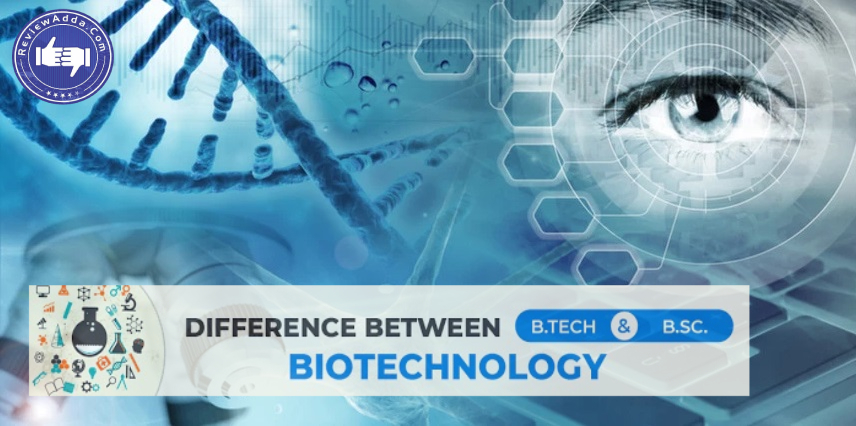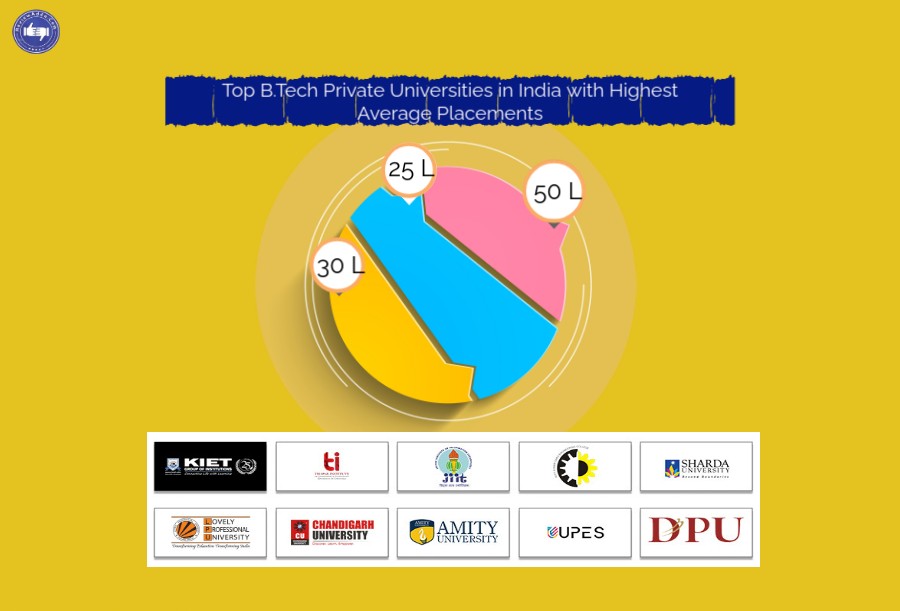Biotechnology is a highly integrative field. It combines biological sciences with Engineering Technologies. To manipulate living organisms and biological systems to produce products that advance agriculture, healthcare, food, medicine, pharmaceuticals, and environment control.

Some of the best innovations and developments that have come out of Biotechnology are natural alternatives to pesticides, genomic sequencing technology, production of biofuels, and improvements in stem cells technology.
To explore this stream, students can opt for a degree among B.Tech Biotech vs B.Sc. Biotech.
These two being so closely related and belonging to the same discipline get many candidates confused as they share a lot of common subjects still, there is a fine line differentiating both.
Through this blog, we are going assist the candidates in comprehending both the programs and know a clear distinction between B.Tech Biotech vs B.Sc. Biotech
- Introduction to B.Tech Biotech vs. B.Sc. Biotech
- Why Study B.Tech Biotech vs B.Sc. Biotech?
- Eligibility Criteria
- Scope of B.Tech Biotech vs. B.Sc. Biotech
- Subjects covered in B.Tech Biotech vs. B.Sc. Biotech
- Career Opportunities
- Top colleges for B.Tech Biotech vs. B.Sc. Biotech
- Wrap it up
1. Introduction to B.Tech Biotech vs B.Sc. Biotech
Introduction to B.Tech Biotech
B.Tech degree in Biotechnology comprises the aspects of both engineering and biological sciences of Biotechnology. The curriculum of B.Tech (Biotech) covers life sciences subjects such as Genetics, Microbiology, Cell Biology, Molecular Biology, etc. Among that, this degree also comprises engineering subjects like Bioprocess Engineering, Biochemical Engineering, Thermodynamics, Mass Transfer, etc.
Introduction to B.Sc. Biotech
On the contrary, B.Sc degree focuses more on the biological sciences aspect of Biotechnology. There will be one or two subjects are related to industrial processes but, the main emphasis will be on R&D in biological sciences fields. Like Plant and Animal Biotechnology, Biochemistry, Molecular Biology, Microbiology, and Microbial Genetics, to name a few.
2. Why Study B.Tech Biotech vs B.Sc. Biotech?
Why Study B.Tech Biotech?
The prime advantage of opting biotechnology is the enormous potential to grow. Every day the field of scientific researchers is growing fuelled by the desire of human beings to develop solutions to the old and newer problem. The recent analyses and surveys are very much in the favor of professionals in Biotechnology. As, Astronauts and Earth Science professionals to find the traces of living beings in outer space.
B Tech Biotechnology Scope isn't limited rather it is so broad that students can easily venture into any stream with ease. The presence of such creatures for the Earth ecosystem will open up tons of Jobs and Research opportunities for the globally accept professionals pursuing the Biotechnology course. A candidate who acquires the combination of right skills has a huge scope to evolve in the field of biotechnology.
This course adorns the students with the necessary skills required in the research and application field. The curriculum designed for B.Tech Biotech students helps the students to become thoughtful individuals, authorized to meet the challenges and broad-ranging career.
They are employed for the major projects by the government or private firms, to present their findings to the public on topics such as bio-fertilizers, bioinformatics, national bio-resource development, medicinal robotics, plant biology, agricultural biotechnology, and marine biotechnology. The candidates are recruited for some of the B. Tech biotechnology Jobs that are:
- Researcher
- Quality assurance engineer
- Biotechnologist
- Biological Science Specialist
- Project Manager
Owing to the greater need for development in bio-technological components across various domains there are various government jobs for B. Tech biotechnology that are open for the candidates but are subject to heavy competition from graduates across the country. According to their job role and the organization they work, the graduates of this course are paid. Biotech Engineers in government projects are often paid a little more than private project since their job is totally based on constant research.
Why Study B.Sc. Biotechnology?
B.Sc. Biotechnology offer students lots of prospective career opportunities. Some of the advantageous of pursuing the graduation in Biotechnology program are as follows:
- After completion of this course candidates will be equipped with the skills to excel in the Bioinformatics and Computer-Assisted Research and Analysis.
- As this course covers a variety of practices and technical knowledge required in the medical field, it opens up a number of career prospects for the candidate.
- Due to the constant innovation found in all industries nowadays, students can be assured of longevity in employment due to their knowledge in the field of Computer Science. This permits students to acclimates their skills and knowledge to any transforms in the industry.
- Candidates who keep their knowledge updated according to the current trends and data will also have the option to diversify into the field of education. For graduates of BSc Biotechnology this is quite a popular career.
- Another unique feature of this course is the inclusion of a Management & Entrepreneurship paper in the final semester. This adorns graduates with the skills to perform well in positions of administration and management.
- The average annual salary earned by a BSc Biotechnology Graduate ranges between INR 3,00,000 - 8,00,000
3. Eligibility Criteria
Eligibility criteria for B.Tech Biotech
Here are some of the mandatory BTech Biotechnology Eligibility Criteria that every candidate should fulfill to gain admission to the course:
- The candidate must have cleared XII exam from the science stream with Chemistry, Physics, Biology, and Mathematics subjects from a recognized board.
- English must be a mandatory language in class 12th.
- At the 10+2 level the students should have secured a min of 75% aggregate marks.
- The age of the candidate should not be less than 17 years.
- It is mandatory to submit the result of JEE Mains or any other equivalent entrance examination.
BSc Biotechnology Eligibility
The eligibility criteria for students who want to pursue a B.Sc. Biotechnology program from Indian universities are mention below:
- Aspirants need to pass 10th and 12th with Biology, Physics, and Chemistry as core subjects. To take admission in B.Sc. Biotechnology, students need to score at least 50% overall (45% for SC/ST candidates) and 60% in each core subject. The candidates from both PCM & PCB are allowed to apply.
- In some cases, candidates have to qualify for entrance exams such as KIITEE, DUET, SAAT, etc.
- Usually, the Entrance is on a University or College level.
4. Scope of B.Tech Biotech vs B.Sc. Biotech
Scope of Biotechnology for B.Tech students:
All the aspiring students who wants to pursue a Career in Biotechnology needs to understand that this field is still developing in India. Both Job openings and pay packages are low when compared to IT.
After a B.Tech degree, students can find jobs in pharmaceutical companies, research labs, and institutions in India. However, most students tend to go abroad to pursue their master's or doctorate studies in Biotechnology and allied fields.
Some also shift towards MBA and enter the world of finance, business, and banking as their engineering background gives them the required quantitative skills to excel in these sectors. Many move to software through on-campus placements.
Let's discuss the on-campus placement drive. Since the number of job openings is limited in Biotechnology. Thus, the number of companies coming for campus placement will be few. Prime companies only recruit students from premiere universities such as IITs, NITs, etc. If your university is not reputed nationally or state-wise, chances of any biotech or pharmaceutical company coming for placements sessions will be low.
Since this field of Biotechnology is highly research-oriented, vast, and diverse. Students receive many recommendations for the same. To the students, that is pursuing their graduate studies in Biological Sciences, Biotechnology, Biomedical Sciences, Bioprocess Engineering, etc.
Scope in Biotechnology for B.Sc students:
If you are a B.Sc. Student in Biotechnology or any other. It is highly recommended that you pursue your M.Sc. The job opportunities for B.Sc graduates in a highly research-oriented field such as Biotechnology is limited. Most students tend to pursue their M.Sc. in Biotechnology.
India is home to some excellent M.Sc. programs such as DU, JNU, IISc, IITs, TIFR, etc. With an M.Sc., most students tend to work in research labs and industries as research assistants. It is highly recommended that you do your M.Sc. in a well-knows institution for good campus placements and job opportunities.
Many M.Sc. students tend to pursue their Ph.D. Degrees in Biotechnology or related fields as a Ph.D. degree opens up more avenues both in India and worldwide. A Ph.D. degree will give you the ability to start your research lab, become a professor or HOD in universities or lead a team of research scientists.
5. Subjects covered in B.Tech Biotech vs B.Sc. Biotech
The subjects that B.Sc. Biotech encircles include:
- Introduction to Biotechnology
- Inorganic Chemistry
- Biochemistry and Metabolism
- Physical Chemistry
- Introduction to Microbiology
- Biostatistics
- Environment Science
- Organic Chemistry
- Immunology
- Molecular Biology
- Genetic Engineering
- Plant Tissue Culture
- Industrial Biotechnology
- Organic Farming
- Technical Writing
B.Tech Biotechnology
Under this discipline the subjects that are taught includes:
- Mathematics
- Foundation of Biotechnology
- Microbiology
- Biochemistry
- Transport Phenomenon
- Biostatistics
- Industrial Microbiology
- Cell and Molecular Biology
- Chemical Engineering Principles
- Genetic Engineering
- Immunology and Immunotechnology
- Animal Cell Culture and Biotechnology
- Bioinformatics
6. Career Opportunities
Career Opportunities after B.Sc. Biotechnology
Since biotechnology is about harnessing the cellular and biomolecular processes to develop technologies and products that can help us in improving our health and the lives on the planet, a wide variety of career opportunities branch out of it.
Some of the most remunerative Career opportunities at which one can work after completing the degree from one of the Best Biotechnology courses in India include the following:
- Biomedical Engineer
- Biochemist
- Medical Scientist
- Biological/Clinical Technician
- Microbiologist
- Process Development Scientist
- Biomanufacturing Specialists
- Business Development Manager
- Marketing Manager
- Lecturer
- Biotech Product Analyst
- Research Scientist
- Research Associate
Career Opportunities after B.Tech Biotechnology
Just after the completion of a B.Tech Biotechnology degree, the candidates can start working in the following fields:
- Information Technology/Bioinformatics
- Waste Management
- Bioprocessing (Agriculture/Food)
- Chemical Laboratory
- Drug and Pharmaceutical Research
- Environment Control
7. Top colleges for B.Tech Biotech vs B.Sc. Biotech
Top colleges for B.Tech (Biotech )
- Indian Institute of Management (IIT)
- Delhi Technological University
- National Institute of Technology
- Anna University, Chennai
- Birla Institute of Technology, Mesra
- Vellore Institute of Technology (VIT), Tamilnadu
- Institute of Chemical Technology, Mumbai
- School of Biotechnology, Madurai Kamaraj University
- Shoolini University, Himachal Pradesh
- Jaypee University
- Cochin University of science & technology
- School of Biotechnology in Devi Ahilya Vishwavidyalaya, Indore
- Karnataka University
- SASTRA University, Tamilnadu
Top colleges for B.Sc. (Biotech )
- School of Life Sciences, University of Hyderabad, Hyderabad, Andhra Pradesh
- National Dairy Research Institute, Karnal, Haryana
- Institute of Chemical Technology, University of Mumbai, Maharashtra
- Department of Biochemical Engineering & Biotechnology, IIT, New Delhi
- University School of Biotechnology, Guru Govind Singh Indraprasths University, New Delhi
- Department of Microbiology & Biotechnology Centre, Faculty of Science, The Maharaja Sayaji Rao University of Baroda, Vadodra, Gujarat
- Department of Animal Biotechnology, Madras Veterinary College, Tamilnadu Veterinary and Animal Sciences University, Chennai, Tamil Nadu
- University Institute of Engineering & Technology, Punjab University, Chandigarh
- Department of Plant Molecular Biology & Biotechnology, Tamil Nadu Agricultural University, Coimbatore, Tamil Nadu
- Bioinformatics Centre, University of Pune, Maharashtra
- Avinashilinagam University for Women, Coimbatore, Tamil Nadu
- Center for Biotechnology, Anna University, Chennai, Tamil Nadu
- Dr BC Guha Center for Engineering & Biotechnology, University of Calcutta, Kolkata, West Bengal
- Department of Biotechnology, University of Kashmir, Hazratbal, Jammu & Kashmir
- Guru Jambheshwar University of Science & Technology, Hisar, Hariyana
- School of Biotechnology, Maduari Kamraj University, Maduari, Tamil Nadu
- Department of Biochemistry, University of Lucknow, Lucknow, Uttar Pradesh
- Department of Biotechnology, Cochin University of Science & Technology, Cochin, Kerala
- Department of Microbiology, Bangalore University, Bangalore, Karnataka
- National Institute of Pharmaceutical Education & Research, Mohali, Punjab
- Department of Biotechnology, Bharathiar University, Coimbatore, Tamil Nadu
- Department of Biotechnology, Himachal Pradesh University, Shimla, Himachal Pradesh
- Devi Ahilya Vishwavidyalaya, Indore, Madhya Pradesh
- Aligarh Muslim University, Aligarh, Uttar Pradesh
- Department of Biotechnology, Karnataka University Dharwad, Dharwad, Karnataka
- Department of Biotechnology, Punjab University, Chandigarh
- School of Biotechnology, Banaras Hindu University, Varansi, Uttar Pradesh
- Sri Krishnadevaraya University, Anantpur, Andhra Pradesh
- Department of Biological Sciences & Bioengineering, Indian Institute of Technology, Kanpur, Uttar Pradesh
- Department of Biotechnology, University of Calicut, Kerala
- Department of Biochemistry, Faculty of Science, MS University of Baroda, Varodara, Gujarat
- Department of Biotechnology, Government Science College, Bangalore, Karnataka
- Department of Biotechnology, Gulbarga University, Gulbarga, Karnataka
- Jamia Millia Islamia, New Delhi
- Sree Chitra Thirunal College of Engineering, Thiruvanthapuram, Kerala
- Deptt. of Studies in Applied Botany and Biotechnology, University of Mysore, Mysore, Karnataka
Top 20 Private Biotech Colleges of India
- School of Chemical & Biotechnology, SASTRA University, Thanjavur, Tamil Nadu
- Department of Biotechnology, School of Bioengineering, SRM University, Chennai, Tamil Nadu
- Department of Biotechnology & Bioinformatics, Jaypee University of Information Technology Solan, Himachal Pradesh
- Department of Biotechnology, Jaypee Institute of Information TechnologyNoida, UP
- Amity Institute of Biotechnology, Amity University, Noida, UP
- Department of Biotechnology, The Oxford College of Science, Bangalore, Karnataka
- Department of Biotechnology, R V College of Engineering, Bangalore, Karnataka
- Department of Biotechnology, Shoolini Institute of Life Sciences and Business Management, Solan, Himachal Pradesh
- Department of Biotechnology, Shri M. & N Virani Science College, Rajkot, Gujarat
- Department of Biotechnology, PES Institute of Technology, Bangalore, Karnataka
- Department of Biotechnology, Kumaraguru College of Technology, Coimbatore, Tamil Nadu
- Department of Biotechnology, Bannari Amman Institute of Technology, Sathyamangalam, Tamil Nadu
- Institute of Biotechnology & Allied Sciences, Seedling Academy, Jaipur, Rajasthan
- Department of Biotechnology, Kamraj College of Engineering and Technology, Virudhunagar, Tamil Nadu
- Department of Biotechnology, Arunai Engineering College, Tiruvannamalai, Tamil Nadu
- Department of Biochemistry and Biotechnology, Avinashilingam University for Women, Coimbatore, Tamil Nadu
- Department of Biotechnology, Acharya Institute of Sciences, Bangalore, Karnataka
- Department of Life Sciences, Reva Institute of Science & Management, Bangalore, Karnataka
- Department of Biotechnology, Gokaraju Rangaraju Institute of Engineering and Technology, Hyderabad, Andhra Pradesh
- College of Biotechnology & Allied Sciences, Allahabad Agricultural Institute Allahabad, UP
7. Wrap it Up!
I guess, this write-up will help you in decreasing your confusion for B.Tech Biotech vs B.Sc. Biotech. It helps you in selecting the perfect course as per your choice.




.jpg)

